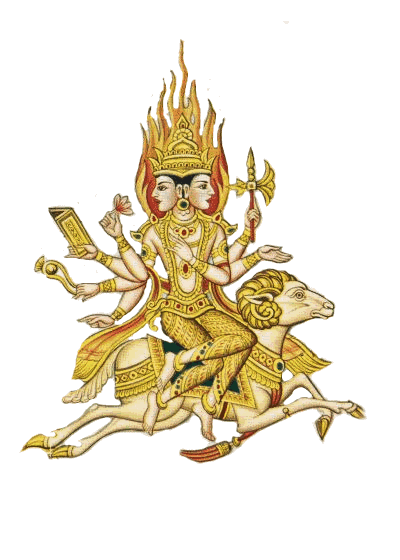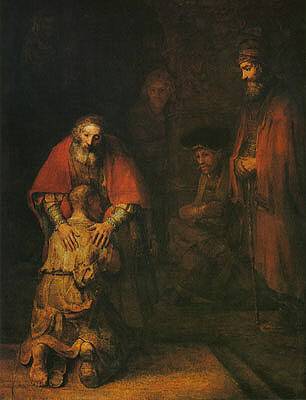God Our Father
Week of Monday July 26, 2004
Lectionary Readings
Christians remain badly fragmented over many issues, some important and others not. But at least one confession that unites us is far more important than whatever divides us. For the last 2,000 years, each Sunday almost every Christian in every country around the world (we’re about 2 billion strong) has confessed the prayer, “Our Father, who art in heaven.” If these words from Luke 11:1–13 are to be trusted, and Christians believe they should be, Jesus tells us that if you want to know what God is like, He is like a loving Father.

 As I walked through the Egyptian section of the British Museum earlier this month, I was reminded that not every religion construes God in such an unguarded and familiar way. The god Sobek, for example, was pictured as a man with the head of a crocodile. Or what about the Hindu fire god Agni? He has two faces smeared with butter, seven tongues, gold teeth, seven arms, and three legs. We could produce similar images almost endlessly; such is the creativity of the human imagination. The philosopher John Hick once observed that if you collected all the notions of God that human religions have manufactured, they would fill a book the size of a telephone directory.
As I walked through the Egyptian section of the British Museum earlier this month, I was reminded that not every religion construes God in such an unguarded and familiar way. The god Sobek, for example, was pictured as a man with the head of a crocodile. Or what about the Hindu fire god Agni? He has two faces smeared with butter, seven tongues, gold teeth, seven arms, and three legs. We could produce similar images almost endlessly; such is the creativity of the human imagination. The philosopher John Hick once observed that if you collected all the notions of God that human religions have manufactured, they would fill a book the size of a telephone directory.
One theory of religion has suggested that these deities are nothing more than our unconscious, psychological projections. In this view, first propounded in a scientific way by Ludwig Feuerbach (1804–1872), and later developed by both Marx (1818–1883) and Freud (1856–1939), “religion is a dream, in which our own conceptions and emotions appear to us as separate existences, beings out of ourselves.” Here, theology, or talk about God, is reduced to anthropology, or talk about man. Prayer is talking to yourself.
Feuerbach, Marx and Freud were wrong in what they denied (that God does not exist), but they were partly right in what they affirmed, that some of our notions about God are little more than human projections of our own making. Far too often, and Christians are not immune from this, we create God in our own, pathetic image. It is one thing for humans to be created in the image of God, but quite another for God to be created in the image of man.
As I think about my own images of God, some very misguided but powerful contemporary metaphors come to mind. I have subscribed to them all at one time or another. There is God as Candy Man or Sugar Daddy who appeals to my self-aggrandizing tendencies. Sometimes God feels like the Absentee Landlord or Reclusive Neighbor. I know that He exists, but He feels hidden, silent, incommunicative, and far away. At least the Psalmists experienced and wrote about this image. God as Vending Machine, Concierge, or Short Order Cook is there to cater to my whims and orders. To wave a magic wand over my problems there is God as Magician, and to engineer a parking space or fine tune some petty detail of my life there is God as Puppeteer. When I feel the weight of my faults and failures, God looms as a High School Principal, Probation Officer, or Divine Accountant. He snoops around in all the dirty details of my life, exposes me, and I am found in arrears, badly wanting in the divine economy. It is election season as I write, and God as Partisan Politician is alive and well to reinforce the worst sorts of patriotism (those that join throne and altar). This tribal deity inhabits both Republican and Democratic precincts. Over the 4th of July, God as National Mascot made His appearance to reinforce our self-referential ideas of exceptionalism, that America is bigger, better, stronger and holier than any country on earth.
This deeply human impulse to create God in our own image is so strong, so misleading, and so dangerous that the Swiss theologian Karl Barth (1886–1968) went so far as to describe the Gospel revelation as the Aufhebung (abolition, annulment, or invalidation) of all human religion. That’s a little extreme for my taste; he seems to throw out the baby with the bath water. But Barth was dealing with Hitler who claimed divine sanction, and his theological professors who had signed on to Hitler’s genocidal program, so his warning is well taken. We do well to listen carefully to the Gospel revelation about who God is and what He is like as a corrective to our own thoughts, feelings and projections.
 During the four years that my family lived in Moscow (1991–1995), we took the overnight train to St. Petersburg a number of times. There, we visited the Hermitage Museum which houses Rembrandt’s Prodigal Son (1636). The painting is enormous (262 X 205 cm), and full of deep, dark reds and browns. In it, the bent over father embraces his kneeling son—with compassion, with tenderness, and without any questions about his many failings.
During the four years that my family lived in Moscow (1991–1995), we took the overnight train to St. Petersburg a number of times. There, we visited the Hermitage Museum which houses Rembrandt’s Prodigal Son (1636). The painting is enormous (262 X 205 cm), and full of deep, dark reds and browns. In it, the bent over father embraces his kneeling son—with compassion, with tenderness, and without any questions about his many failings.
What is God like? Jesus says that He is like an earthly Father who would do almost anything to bequeath all that is best to his children. He is like a loving Father who embraces us and welcomes us home. He is strong, affectionate, protective, impeccably safe, and unconditionally loving. In his work of redemption Jesus reconciles us to this loving God; in His work of revelation He shows us what this God is like: “He who has seen me has seen the Father”.





